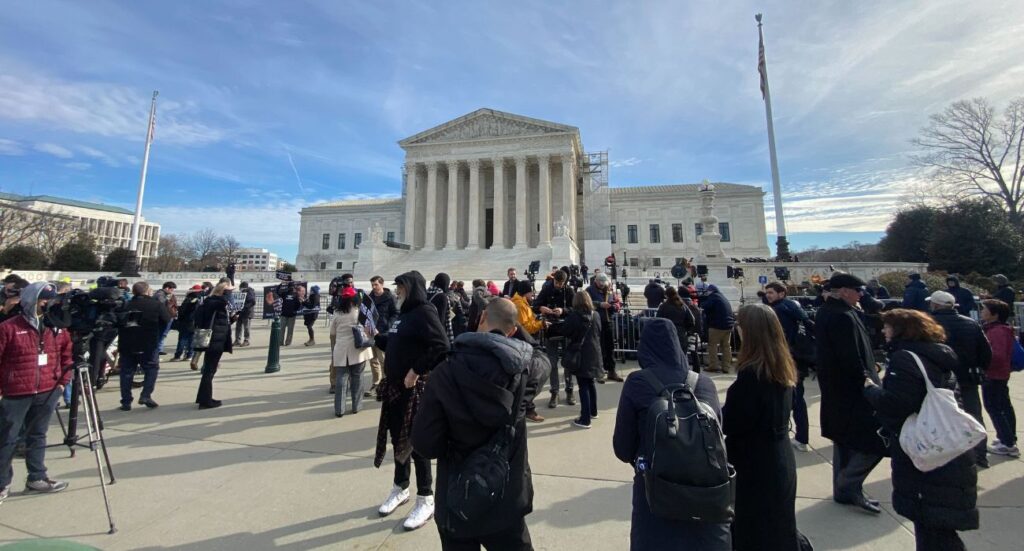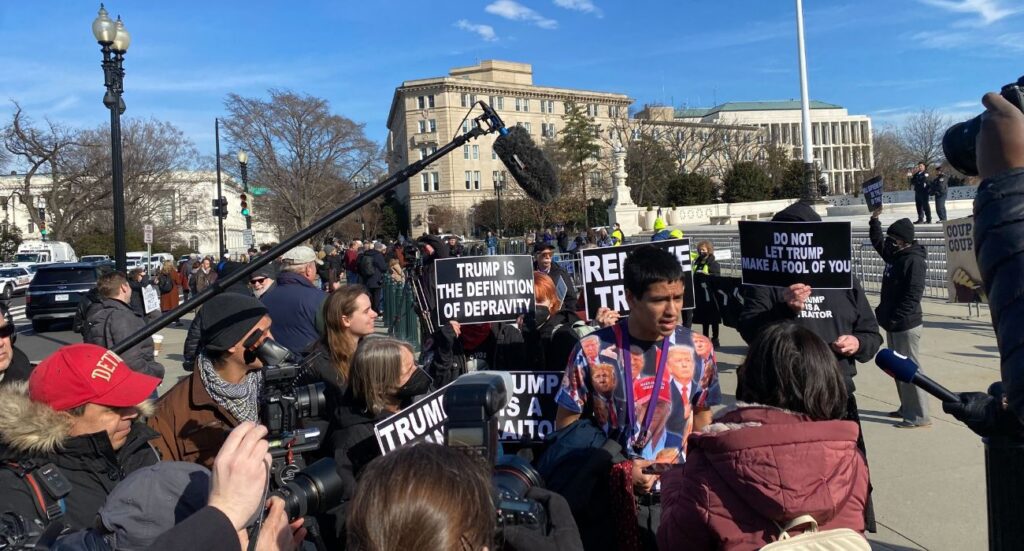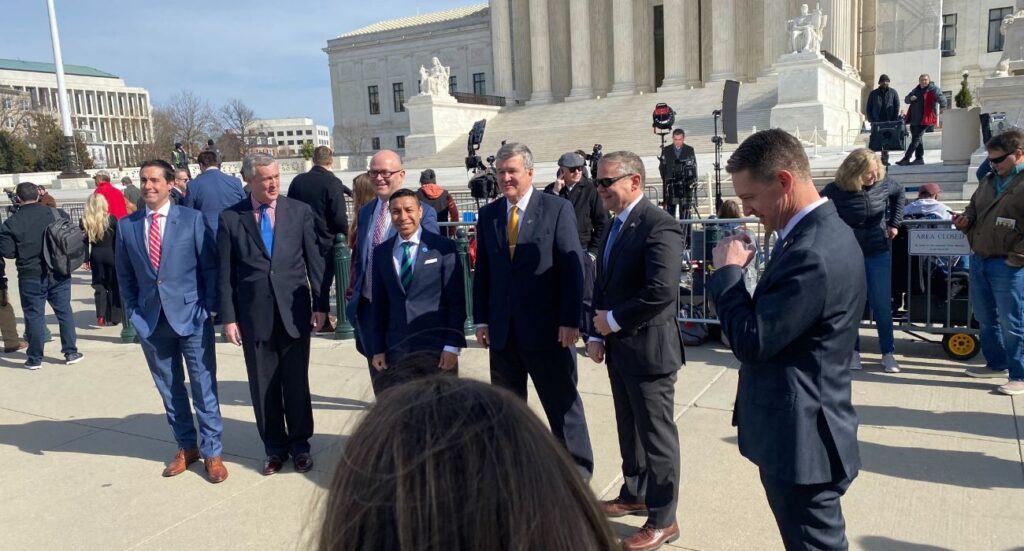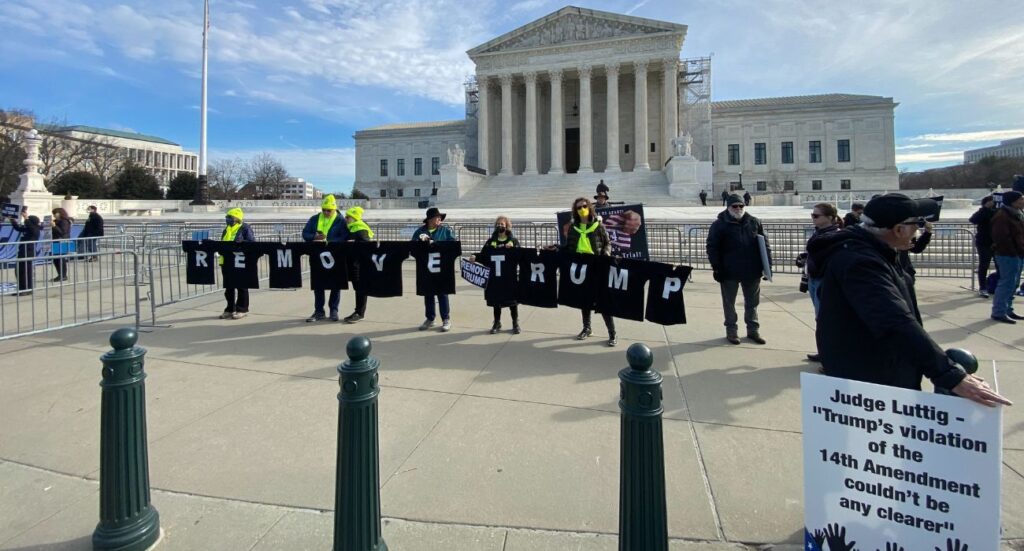WASHINGTON, D.C. — The U.S. Supreme Court heard oral arguments Thursday on whether the state of Colorado could keep former President Donald Trump off its ballots, and The Dallas Express joined observers outside the high court to gauge reactions throughout the day.
A majority of the members of the Supreme Court, including those appointed by Democrat presidents, appeared to agree with arguments made by lawyers for Trump, who are seeking to overturn a Colorado ruling barring him from appearing on the state’s presidential primary ballot for allegedly having engaged in an insurrection.
As was expected, Trump’s attorneys made three independent arguments against the Colorado Supreme Court’s ruling. The last and least touched upon was whether Trump was guilty of insurrection for his actions in challenging the 2020 presidential race results.
Instead, SCOTUS justices and the lawyers arguing the case focused on interpreting the applicability and enforcement mechanism found in the two sections in the Fourteenth Amendment to the Constitution that became the basis for the Colorado ruling. This is a Reconstruction-era Amendment passed after the Civil War which declares that anyone who engages in insurrection against the United States cannot hold certain offices.
The justices engaged in spirited debates with the two sides’ attorneys on whether the provision, found in Section 3, applied to the office of the president at all. Moreover, they discussed whether individual states even had a right to enforce Section 3 via Section 5’s enforcement language.
Jason Murray, the attorney who argued against Trump on behalf of a group of Colorado voters, made the argument that Section 3 should be broadly interpreted to include the office of the president.
“Section 3 uses deliberately broad language to cover all positions of federal power requiring an oath to the Constitution,” he argued, adding that the section applies to “any federal office or anyone who holds one.”
But when he was promptly challenged by Justice Clarence Thomas to point to historical precedence when a national candidate was disqualified by a state, the best Murray could do was refer to Congress refusing to seat a candidate that had won the election. In doing so, he inadvertently bolstered Trump’s third argument, made by his lead attorney, Jonathan Mitchell, that the enforcement of Section 3 rests solely with Congress and not the states.
The justices challenged both sides to defend their arguments when faced with various hypotheticals, but even some of the traditionally left-leaning justices appeared skeptical of Colorado’s ability to remove Trump from the ballot.

For instance, Justice Ketanji Brown Jackson, usually a steadfast opponent of Trump and his policies, suggested several times to Murray that the office of the president was intentionally left out of the wording of the Fourteenth Amendment.
“Why didn’t they put the word president in the very enumerated list in Section 3? Doesn’t that at least suggest ambiguity?” Jackson asked.
She reasoned that the drafters of this amendment were concerned with former committed Confederates retaking control of local offices and running for Congress.
Chief Justice John G. Roberts reinforced that point when he noted that Section 5’s enforcement mechanism specifically put that power in the hands of Congress because the formerly defeated Confederate states could hardly be expected to police themselves.
The Fourteenth Amendment “augmented federal power under Section 5. Congress has the power to enforce it.” Roberts argued.
He then challenged Murray: “Wouldn’t that be the last place that you would look for authorization for the states, including Confederate states, to enforce … the presidential election process? That seems to be a position at war with the whole thrust of the Fourteenth Amendment and very ahistorical.”
The justices and attorneys all seemed to agree that the case could be decided in favor of Trump either on procedural grounds, meaning that Colorado was acting outside its authority to disqualify the candidate, or on its merits, meaning to decide whether Trump is guilty of insurrection.
Both sides appeared in favor of making a decision on the merits in order to avoid a scenario where a re-elected Trump faces a hostile Congress that may be intent on denying him the office based on the insurrection charges.
“I think it could come back with a vengeance because ultimately members of Congress may have to make the determination after a presidential election,” Murray argued, pointing out that “Trump himself urges this court in the first few pages of his brief to resolve the issues on the merits and we think that the court should do so as well.”
The Dallas Express spoke with Josh Blackman, professor of constitutional law at South Texas College of Law, who had presented at a Heritage Foundation panel on the case on Wednesday. Blackman suggested that Chief Justice Roberts would be the key to how the Court would rule.
“I think we’ll see very quickly tomorrow which way he’s sort of leaning, and if Roberts is of the opinion that Trump should be disqualified, I think he’ll bring five votes with him,” he said.
As expected, the scene outside the courthouse while oral arguments were presented was colorful and opinionated.

The Dallas Express spoke with one young man from the United Kingdom named Jack, who was in Washington, D.C., on a school trip. He was holding a sign saying, “Trump violated the Fourteenth Amendment. Couldn’t be any clearer.”
“Personally, I believe Donald Trump shouldn’t be able to run,” said Jack, who is 18 years old. One reason he gave for opposing Trump was the former president’s stance on supporting Ukraine. “I think America as an ally of Europe should support us and help us in Europe fighting Russia.”
The Dallas Express also spoke with Mac Warner, the West Virginia Secretary of State, as he was joined outside the courthouse by a group of Republican Secretaries of State from around the country.

“I’m here interested in the outcome of this case. We need to clear things up with regard to ballot access. I think this case will do it,” Warner said.
“It should be very clear that it’s not the role of the Secretary of State to weaponize the system and decide who goes on the ballot and who shouldn’t,” Warner added. “Some of these Secretaries of the State have been overreaching and been trying to win this political fight in the courts rather than in the ballot boxes, where it should be.”
Warner also suggested that the Supreme Court strive to settle the matter of whether Trump is guilty of insurrection so that the country could move on to the election process.
“To me, this is a rather simple case,” he said. “One, there was no insurrection, so that takes that Section 3 argument out of it.
“And then two, the Secretary of State shouldn’t be overstepping their boundaries and making judgment calls based on politics. If the candidate meets the qualifications regardless of party, they should go on the ballot and let the people decide who the president should be.”



